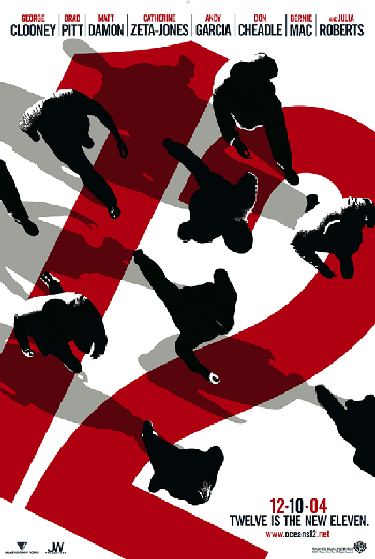Roar of Greasepaint
I predicted this a few weeks ago, and now it’s coming to pass: Joel Schumacher’s The Phantom of the Opera (Warner Bros., 12.22) is making its way, buzz-wise, into the Best Picture Oscar race.
This lavishly produced (I’m told) musical, which almost no one has seen but is based, as everyone knows, on the popular Andrew Lloyd Webber stage musical, has become a big Best Picture “maybe” largely due to a story written by New York Times reporter Sharon Waxman that ran yesterday (10.28).
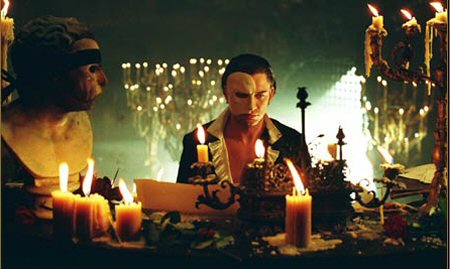
“You know it’s going to be a strange year for the Oscars when November is just around the corner and the talk in Hollywood is about The Phantom of the Opera,” her story began.
Schumacher, Waxman continued, “is not exactly an Oscar habitu√ɬ©, never having been nominated before. But the need for buzz, any kind of buzz, is very real, and a sure sign of Oscar desperation.”
< ?php include ('/home/hollyw9/public_html/wired'); ?>
I haven’t seen Phantom either, but knowing Schumacher’s work as I believe I do, and having spoken to a bright fellow who has in fact seen Phantom, it sounds to me like the sort of Best Picture nominee that the squares and the blue-hairs will rally ’round, like they did last year for Chicago.
I’m inclined to believe this (although, to repeat, I know absolutely nothing first-hand) because my source has told me that Phantom, although well performed, richly assembled and probably very commercial, is glitzy and overwrought. He also doubts it’ll become a critical darling “and you need critics in an Oscar race.”
Oscar talk is building nonetheless, one gathers, because red-state moviegoing tastes are as much in evidence in Beverly Hills as they are in Mobile or Duluth, and we all know (or at least suspect) that folks who think red tend to applaud emotionally grandiose “art.”
For Academy members of this persuasion, an emotional plunging-over-the-waterfall experience — i.e., one that’s not necessarily abundant in terms of delicacy or succinctness or representations of plain-truth reality, but is lathered in faux-emotional foam — is what Oscar-bequeathing is all about.
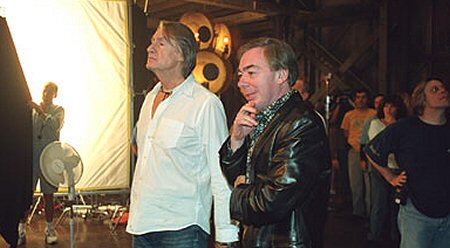
Here’s what my guy says, precisely:
“I think [Waxman’s] out of her mind,” he began. “This is a big, over-the-top, glitzy Joel Schumacher special. It’s a theatrical construct that Joel has chosen not to turn it into something realistic, but into a visually lush, overwrought Hollywood musical.
“It’s just a question of taste…of being over the top and a little campy…a little bit of the Batman syndrome…it’s a little `much.'”
“It’s very commercial, actually. It’s a very commercial movie. I just don’t see it as an Oscar film because the critics are going to be hard on it. I could be wrong. [A friend] saw it with me, and we both didn’t think it was going to be an Oscar film. One of the problems is Gerard Butler, who plays the Phantom, but Emmy Rossum and Miranda Richardson are very good.
“I could be wrong about the Oscar chances. It could be a Chicago thing all over again, with people of discriminating taste saying no but Academy members loving it anyway – it’s a gorgeous film to look at, it’s absolutely stunning, and Academy members tend to love that and tend to fall all over themselves in admiring the craft of it.”
Set in 19th Century Paris, the story concerns an obsessive mask-wearing hideaway named Erik (Gerard Butler), and his growing impassioned love for a pretty young opera singer named Christine (Emmy Rossum).

“Everyone knows this, but thematically, of course, it’s a beauty and the beast tale,” the guy continues. ” It says we should get beyond the superficial appearance of things, and Butler plays one of those damaged outsiders. You’re supposed to see the beauty of his soul, and there’s a musical connection, an artistic connection, between [he and Rossum], and there’s this great realm that the two of them inhabit in Paris.”
Most of the Phantom action takes place at the Paris Opera house (the old one at Place de L`Opera, not the relatively soulless one at Place Bastille). The film was shot at England’s Pinewood Studios and in London.
I’m not saying Joel Schumacher hasn’t sometimes risen to the occasion. His best films — Falling Down, The Client, Tigerland — show he’s capable of this. I really loved one of his earliest films, D.C. Cab. It’s got a great spirit, and Gary Busey gave one of his career-best performances in it.
But the idea of the director of A Time to Kill, Flatliners, Dying Young, Batman Returns, Batman and Robin, Flawless and Veronica Guerin having supposedly found something new and vital within himself and directed a film that genuinely warrants Best Picture consideration…I don’t know. That’s a tough one to process.
More Balkanizing
Here’s how the rest of yesterday’s Sharon Waxman piece breaks down in terms of red state vs. blue state movies. I may have hit on a new permutation here. Movies and politics have been bleeding into each other for a long time, so it’s not surprising to hear handicappers using similar terminology.
Bottom line: the Academy is made up almost entirely of blue staters who tend to lean red when handing out Best Picture Oscars.
Red being, of course, indicative of common emotional themes that Average Joe’s with pot bellies and baseball caps can easily understand and relate to and digest, and blue referring to stories and emotional matters reflecting the lives of folks with better educations, tonier lifestyles and cultivated lefty attitudes.

There’s nothing new or trail-blazing in the observation that a lot of the Best Picture Oscar winners — Titanic, Braveheart, etc. — have been red. I guess I’m also saying that a blue movie, no matter how good it is, will always have an uphill fight.
The Phantom of the Opera is almost surely a red-state movie — allegedly broad, lavish, grandiose emotions worn on its sleeve, etc.
Alexander Payne’s Sideways, which Waxman acknowledged as a critical favorite (read: not necessarily Oscar-worthy), is without question the most deserving Best Picture candidate so far. It’s a soulful, mature, quietly emotional film about love and pain and the whole damn thing, etc. It’s got it all (including some great laughs), and the Hollywood mainstreamers Waxman spoke to for her piece are going, “Eh.” Why? Because it’s blue.
Martin Scorsese’s The Aviator is about a blue-state kind of guy (the hard-driving, OCD-ish Howard Hughes) and directed by a hard-core blue-stater (Martin Scorsese), but it supposedly has an escapist entertaining mood, which is kind of a red-state concept (keep your head down, live in your own self-created zone, go into denial and be “happy,” etc.). So it’s kind of a red-blue mix.
Oliver Stone’s Alexander is basically about redeeming courage and life being for the stout-of-heart few, but it’s also selling itself as a bloody action thing, so that makes it mainly a red-state package.
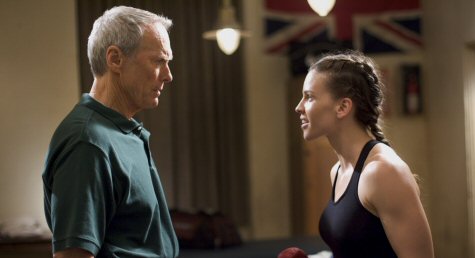
Walter Salles The Motorcycle Diaries (viva Che!) is, of course, a total blue-stater. Ditto Jean-Pierre Jeunet’s A Very Long Engagement (soldiers ducking out of battle, searching for a lover), Pedro Almod√ɬ≥var’s Bad Education (same-sex soap opera) and Alejandro Amen√ɬ°bar’s The Sea Inside (assisted suicide).
Eastwood’s Million Dollar Baby, a surrogate father-daughter relationship piece about a lady boxer, seems to have a populist red-state mentality, for the most part. Sports movies in and of themselves tend to be red, and don’t forget that Eastwood’s a longtime rightie.
Fahrenheit 9/11 — obviously blue through and through. Finding Neverland is blue. Richard Linklater’s Before Sunset is blue. The sexually frank Kinsey is totally, obviously blue. Maria Full of Grace, blue. Mike Nichols Closer and James L. Brooks Spanglish, both blue.
The rousing, relatively uncomplicated, all-American Ray is red. The small town, football-worshipping Friday Night Lights is obviously red. The Passion of the Christ, drenched in the sticky stuff, is clearly the reddest of the bunch.
Let It Go
A couple of weeks ago I was talking about throwing sound clips into the column on a semi-regular basis, and of course I haven’t done it since. So here’s a supplement to the defunct What’s That Line? page, which I jettisoned a month or so ago. Just listen to this guy and tell me what movie it’s from. I made it deliberately easy, so no complaints about this. Harder ones are soon to come.
Root of It
Apologies to David O. Russell and the Independent Film Channel for not putting this article about Soldiers’ Pay up until now. I tried last Friday but the clock and the schedule said no.
Soldiers’ Pay is a 35-minute documentary that was shot by Russell, Tricia Regan and Juan Carlos Zaldivar last summer, and then edited by Russell. Essentially about a strange discomforting episode experienced by certain G.I.’s in Iraq after the fall of Saddam Hussein, it’s set to air three times on IFC on Monday, 11.1, as part of an Election Eve marathon.
The doc tells a real-life story that echoes the story of Russell’s Three Kings, which was about three Gulf War soldiers trying to make off with gold bullion worth many millions. The Soldiers’ Pay version is about the actual finding of hundreds of millions in cash while G.I.s searched homes of this or that Hussein Baghdad loyalist.
The temptation was severe and some soldiers pocketed whatever loot they could. Some of them were found out and paid the price. By telling their story Russell is trying to shed light on the various corruptions going on over there, and the matter of who’s making out and who isn’t. He calls their story a “holographic paradigm…it’s a part representing the whole.”

The intention was to “just let these guys tell their story,” Russell said in a phoner last Friday morning.
The doc asks “whether we went there to defend the oil, and says if we treat this arena as a supermarket for our own oil needs, then this [mentality] trickles down.”
Russell, Regan and Zaldivar didn’t just interview veteran noncoms, but native Iraqis, journos like the New York Observer‘s Nicholas von Hoffman, politicos (Republican Rep. David Dryer), psychologists, and Major General J. Michael Myatt, a Gulf War veteran who delivers the film’s saddest and most emotional moment.
Russell said he hoped the doc “might make a difference before the election.” The plan was for the doc to be included on a new DVD of Russell’s Three Kings , but Warner Bros. marketing execs kibboshed this when the doc’s pronounced political import was highlighted in a Sharon Waxman New York Times article that ran last August.
Soldier’s Pay will be distributed on DVD by Cinema Libre, the distribution arm of leftie documentarian Robert Greenwald. Russell said he didn’t know precisely when the DVD will come out, but I would imagine sometime fairly soon. The three 11.1.04 IFC airings will happen at 9:35 pm, 12 midnight and 2:15 am EST, or 6:35 pm, 9 pm and 11:15 pm Pacific.
Good Guy
I’m late on this, but like everyone else I’m very sorry about the passing of Golden Apple Comics owner Bill Liebowitz, a good hombre who died suddenly last Wednesday, 10.27.
Bill wasn’t a friend, but he sometimes helped me with an occasional story and was always ready to help with anything. He was gracious, accommodating and spirited as hell. There was no missing his quickness and aliveness, or the size of his heart.
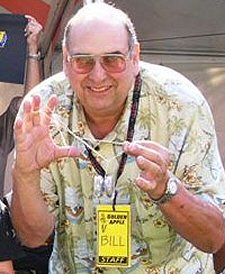
Liebowitz’s Melrose Avenue Golden Apple store (the other one is in Northridge) is one of the greatest retail-level pop culture meccas ever created. Crammed with comic books, action figures and all kinds of movie-related products and promos, it will remain a tribute to the guy who put it all together.
Liebowitz said on his website that his goal was “to develop Golden Apple as the world’s greatest comic book store… and more. We are constantly changing and experimenting with new ideas, and we don’t intend to stop. We’re very proud of what we’ve achieved, and where we are today.”
My sympathies to his wife Sharon and the rest of the Golden Apple crew.
